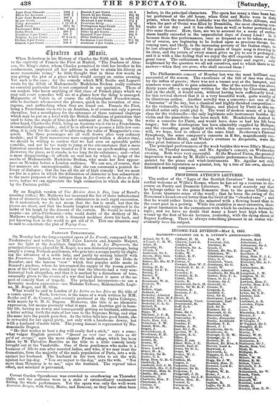iltratrro nut 3u r.
When Robertson in his History of Charles the Fifth said, in reference to the captivity of Francis the First at Madrid, "The Duchess of Alen- eon, the King's sister, whom Charles permitted to visit her brother in his confinement, employed all her address in order to attain his liberty on more reasonable terms," he little thought that in these few words he was giving the plot of a piece which would occupy an entire evening. Yet such is the case ; for the comedy which MM. Scribe and Legarve wrote for the debilt of Mademoiselle Madeleine Brohan really contains no essential particular that is not comprised in our quotation. Those of our readers who know anything of that class of French plays which we may call court comedies will see at a glance how the thing is managed. Marguerite of Valois is, of course the all-triumphant Frenchwoman, able to fascinate whomsoever she pleases, quick in the invention of stra- tagems, and unflinching when they are found out. Francis the First, being a Frenchman vis-a-vis to an Austrian, is of course not only a preux chevalier, but a mouthpiece for the utterance of those national claptraps which may be put on a level with the British ebullitions of patriotism that used to form the staple of blue-jacket sentiment at the Surrey. On the other hand, Charles the Fifth, being an Austrian vis-a-vis to a Frenchman, is essentially disagreeable ; and if he is allowed to possess a little low cun- ning, it is only for the sake of heightening the value of Marguerite's con- quest. The three personages are all well drawn after very ordinary models ; and if their manoeuvres were comprised within a shorter time, we should be willing to confess that we had seen an agreeable petite comedic, and not be too ready to jump at the circumstance that a mere historical anecdote has been treated as if it were an epoch-making event. However, the piece, as it stands, is too long for its substance ; and—what is most disappointing—it affords no real test by which to judge of the merits of Mademoiselle Madeleine Brohan, who made her first appear- ance on Monday before a London audience. We can see, of course, that her manners are unexceptionable ; that she can command a pointed de- livery of dialogue ; that she has all the air of high comedy : but we must see her in a piece in which the delineation of character is less subservient to the mere purposes of the intrigue than in Les Conies de la Reine de Na- varre, before we can appreciate the high estimation in which she is held by the Parisian public.


























 Previous page
Previous page